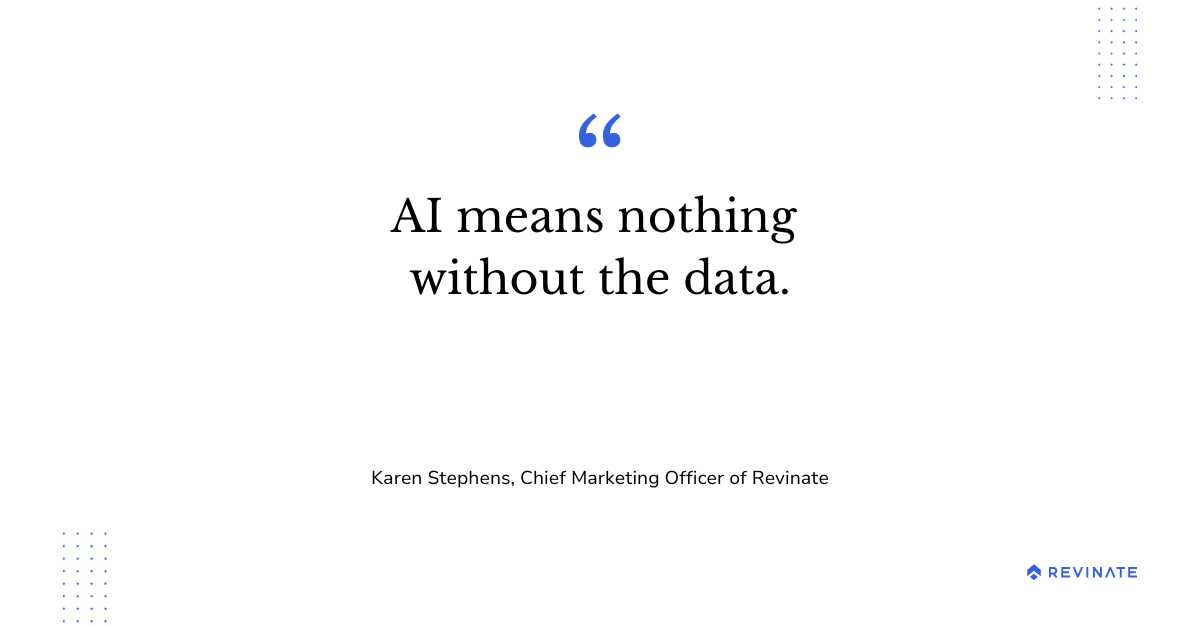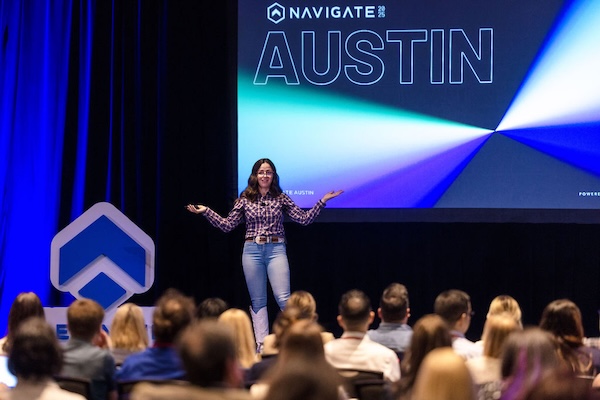AI in hospitality: Using it to personalize guest experiences
AI in hospitality: Using it to personalize guest experiences
When you were envisioning your career as a hotelier, odds are that you didn’t imagine spending days drowning in guest data. And now, thanks to AI in hospitality, those days can be over.
AI for hotels is more than just a buzzword. It’s a tool hoteliers can use to organize and make sense of the guest data they have — providing actionable insights to use in personalized guest communication. Because the reality is that no hotelier is immune to the chaos unwieldy guest data can create.
With guest data flooding your database from multiple channels 24/7, hoteliers deserve technology that can keep up with the pace and make personalization scalable. Relying on your staff to manually collect and action data in guest communications is unnecessary and becoming obsolete.
Plus, modern guests are expecting completely unique, personalized experiences that make them feel seen and heard. And the goal of precise personalization starts with your data, making AI technology that can be leveraged to service that goal worth investing in.
What is AI in hospitality?
AI in hospitality can take on many forms. Large language models (LLMs) like ChatGPT, Gemini, and Claude, use AI and machine learning to process, understand, and interpret large data sets to generate text using human language.
Aside from LLMs, AI in hospitality can be found deep within hoteliers’ tech stacks. Here, AI can assess large quantities of data and extract key pieces of information. Have hundreds of guest reviews and need to understand the overall sentiment behind them? AI can do that. Have several duplicates of the same email address with variations? AI can identify the correct one and match it with the right guest.
Some hotel technology trends come and go, but AI in hospitality has staying power — and it’s fundamentally changing the way hoteliers operate and interact with guests. It’s never been easier to utilize hotel guest personalization technology to instantly access data on guest preferences, previous stays, and even current behavior. And this allows you to present those highly tailored offers and services your guests are craving.
Fed by your guest data, AI in hospitality not only makes your hotel more efficient, but it also reduces costs that would otherwise be spent on legacy technology. The key is to feed your AI with the data it needs to thrive.
AI in hospitality means nothing without the data
In the words of Revinate’s Chief Marketing Officer, Karen Stephens, “AI means nothing without the data.” AI in hospitality thrives off data, so in order for your AI technology to extract the actionable insights you’re looking for, data collection must be a priority.
The problem arises when your data collection efforts are thwarted by siloed data systems and data fragmentation. It’s difficult to uncover the story your data is trying to tell you about your guests when the data is quite simply all over the place. And manual analysis of that data just wastes time and resources. Data management has evolved beyond manual analysis and requires hoteliers to grasp the full picture of their guest data in order to leverage it effectively.
Bringing your data together in one place, on one platform, makes it easy for AI technology to do the work and help you make sense of your data. Because your data is gold, and without it you don’t have a complete picture of your guests. AI, like the AI in Revinate’s Customer Data Platform, unifies guest data to reveal preferences, behaviors, and connections for a complete 360-degree view of everyone visiting your hotel.

How AI unlocks actionable insights
“I’m hoping that AI can help us through the jungle of data to find exactly what we’re looking for,” says John Burns, President of Hospitality Technology Consulting.
According to John, AI in hospitality can be used as a navigational tool. With massive amounts of datasets at your hotel’s disposal, you don’t have enough time or manpower in the world to “navigate” it all and extract the actionable insights you need to target your guests.
AI for hotels tells you what’s relevant and points out the preferences of your new and returning guests, so that you can speak to them uniquely. It’s AI-driven marketing at work. Gone are the days of “analysis paralysis” — your teams hunched over, parsing through guest data and trying to decide what’s important and what’s not.
Now, personalization is automatic. Looking for the perfect upsell for a returning guest? Evan Crawford, VP of Marketing at Pyramid Global Hospitality, illustrates this saying, “[What] iIf AI could say something like, ‘Here’s your arrival. This guest loves cabs and this specific wine?.’” Evan goes on to say that AI in hospitality answers the question of, “How do we create surprise-and-delight experiences?” Hotel guest personalization technology like this is what brings hoteliers closer to answering this question with the insights they need to connect with guests.
Meeting guest expectations in 2025 with AI-powered personalization
“The need for personalization becomes bigger and bigger. Hospitality is only touching the surface of it,” says Capser Overbeek, Chief Product Officer at citizenM.
As guests expect more personalization, generic offers won’t fly — especially with those looking to pin their loyalty on a brand that gets them. Your key to deploying the personalization needed to attract and retain your most profitable guests resides in your hotel touchpoints. This is where AI in hospitality should be part of your plan — gathering guest preferences from your restaurant, spa, and any other touchpoint to feed to your AI technology. Personalized offers can be the starting point of a lasting relationship and an opportunity for a guest to say, “Wow! They know I love the coconut facial, and they’re offering me a discount on my birthday too! They get me.”
Value should be the end goal of your personalization efforts — and the entry point for a guest to pledge their loyalty to your hotel. As Revinate’s Chief Marketing Officer Karen Stephens shares on the Hotel Moment podcast, “If it’s not delivering value to the customer, they’re not going to use it.” Karen is describing why hoteliers’ tech choices matter and why AI for hotels can deliver value to their guests with ease. Because AI and the customer experience go hand in hand. AI is what enables hoteliers to stay on top of guest preferences and deliver memorable experiences unique to each guest.
Beyond the first stay: AI and repeat guest recognition
If you have a large portfolio, chances are the same guests are visiting multiple properties, and it’s your job to ensure they’re recognized. AI in hospitality can help bridge that gap between properties — extending beyond the first interaction, and building lasting guest relationships.
According to Casper Overbeek, Chief Product Officer at citizenM, “If you come to your favorite place often, you’ll be recognized, but not if you’ve been at another branch. We can take that next step.” Utilizing AI for hotels is the next step to take.
Guests want to be recognized, and the path to giving them the recognition they deserve starts with collecting the data breadcrumbs your guests leave behind. Technology like a Customer Data Platform ingests all of your guest data, stores it in one place, and uses AI technology to clean, unify, and enrich that data into comprehensive guest profiles of everyone visiting your portfolio. Without it, your guest insights stay fragmented, limiting your ability to create meaningful, personalized experiences.
As we said before, AI and the customer experience go hand in hand — allowing hotels to scale personalized experiences, regardless of the property size or number of locations. As John Burns shares, “Personalization is part of a relationship that we are building and maintaining.” By leveraging AI in hospitality, hotel chains can ensure guests are recognized and treated like VIPs no matter where they stay.
How AI drives more direct bookings
Too often, hoteliers don’t realize their superpower: the ability to give guests what OTAs can’t. As a hotelier, you can create a beautifully designed, personalized guest experience that OTAs just aren’t capable of crafting. That personalization superpower will win your hotel more direct bookings. And that’s what AI in hospitality accomplishes.
How? Well, if you’re already using AI to extract insights about your guests, you can apply those insights for compelling guest communication to book direct. For example, if your guest dined at your hotel restaurant during their last stay and enjoyed the lobster special, that’s data for your next email campaign. Now that you know this guest enjoys that particular special, you can send a one-time campaign promoting your hotel restaurant with a special discount when the guest books direct.
John reiterates that hoteliers have the data — it’s just about using AI to action it. “We have a mountain of data that we have to analyze and distill in a microsecond to achieve this personalization.”
AI in action: 3 real-world use cases for hotels
Here are a few ways you can use AI to increase your hotel’s revenue.
1. Automated personalized offers
AI-driven dynamic pricing and upgrade recommendations allow hotels to present personalized offers guests are likely to take advantage of based on guest behavior and preferences. With AI-driven marketing campaigns, hotels can increase revenue through personalized upsells and cross-sells like Zoku Hotels — driving €11,500 per automated campaign.
2. Predictive guest needs
Collecting data from guests on property and storing it in their profile makes it easy for AI to anticipate their preferences based on past stays — ensuring each interaction feels tailored and thoughtful. If a guest frequently requests extra pillows for their stay, AI technology will tell you to have them available upon arrival. It’s the method The Arca used to build more loyal guests and achieve HK$ 1.6M in lifetime revenue.
3. Operational efficiency
AI-powered messaging increased operational efficiency by taking the burden of responding off of the front desk — reducing time spent on repetitive inquiries and allowing staff to focus on providing exceptional service. AI tools in Revinate’s Customer Data Platform can also improve operational efficiency by completely eliminating manual data collection — preventing your staff from sorting, sifting, and categorizing data from multiple guest touchpoints. One King West is improving operational efficiency with AI-powered text messaging that frees up their staff.
5 Steps to Implement AI-Powered Personalization in Your Hotel
Ready to start using AI to grow your hotel? Here are the five steps you need to take starting today.
1. Audit your data
Is your data siloed, messy, duplicated, and unorganized? Then it might be time to make some technology changes. Operational efficiency is much more achievable when guest data is clean, structured, accessible, and ready to action for any marketing campaign. AI in hospitality makes it easy to house guest data that’s ready to personalize especially when you’re using a Customer Data Platform.
2. Invest in AI-driven technology
Automating guest insights and marketing helps drive better personalization and revenue, especially with your email campaigns. Try setting up automated campaigns to send to the right guest at the right time, so you can avoid more manual work for your teams. With Revinate Marketing, you can even use AI to test emails for optimization so that you know you’re getting the maximum return and that your messages are resonating with guests.
3. Eliminate “analysis paralysis”
Let AI filter key insights for faster action — removing the overwhelm of data overload. Because “analysis paralysis” for your teams can be avoided, and no one on your team needs to spend hours sifting through data in search of the right information about each guest. AI in hospitality helps build your guest profiles so you can make data-driven decisions in real-time.
4. Personalize pre-arrival and in-stay communications
AI for hotels can be used to send tailored offers and messages to enhance guest engagement before and during the stay. After all, every stage of the guest journey matters, and every stage is an opportunity to provide value to your guests. AI hotel guest personalization technology is what makes offers successful — from the discount to extend a stay sent two days before arrival to the discount for a noon tee time sent to a frequent golfer and business traveler upon arrival to the post-stay offer for a free night when booking direct for the next stay.
5. Track and optimize
Continuously monitor the performance of your AI-driven strategies, and adjust your approach based on guest feedback and data insights. And your email campaigns are a good place to start. Did the campaigns using AI technology to segment and personalize have higher open rates, click-throughs, and conversions than the email campaigns without it? If so, that’s a good sign that your messages are resonating with guests.
Key takeaways
- AI in hospitality is transforming guest personalization with automation — making it scalable and precise.
- Unlocking insights from guest data becomes more efficient using AI for hotels — eliminating manual data analysis and allowing for more informed decision-making.
- AI-driven personalization enhances guest experiences is the pathway to increase loyalty as guests gravitate towards hotels that deliver value to them.
- Investing in AI technology is crucial to stay competitive in the evolving hospitality landscape. If you know your guests better than your competition, guests will likely choose you over any other hotel.
Listen to the latest episode of the Hotel Moment Podcast to hear how industry leaders are using AI in hospitality to create more personalized guest experiences.
For more insights into AI-driven hospitality and maximizing guest loyalty, visit Revinate’s blog.
Related Posts
This site is protected by reCAPTCHA and the Google Privacy Policy and Terms of Service apply. View our Terms & Conditions here. *Required fields.



